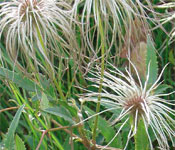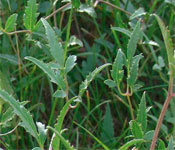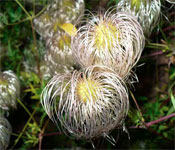- Ag. Service Board
- A.S.B. Members
- About Us
- Annual Report
- A.S.B. Minutes
- Programs, Services
& Rental Equipment - Invasive Weeds
- Crop Diseases & Pests
- Tree Diseases & Pests
- Planting Shelterbelts
- Vertebrate Pests
- Alberta Rat Control Program
- Municipal Tankloaders
- Agricultural Pesticide Empty
Container Collection Sites - Farm Family Awards
- Municipal Photo Contest
- Newsletters
- Upcoming Events & Updates
- Photo Gallery
- Links
Yellow Clematis (Clematis tangutica)
Family - Buttercup family
Life Cycle - perennial
Habitat - tolerant of cold, drought, nutrient-poor soils, and part shade, but prefers full sun, can be found thriving in open woodland, grassy areas and even gravelly areas.
Stems
Several stems per plant, growing up to 3-4 m long. Young stems are green while the older stems are tough and woody.
Leaves
Leaves are bright green and compound with 5-7 lance-shaped leaflets 5-6 cm long, which may be lobed. Leaf tips are pointed and leaf edges are coarsely toothed. Leaves may be slightly hairy on the underside and are deciduous.
Flowers
Flowers are lemon-yellow, nodding, with four petals, and appear mid-summer through late fall. Flowers are bell-shaped at first and then flatten as the petals spread. Petals may be silky-hairy on the outside and occasionally tinged purplish-brown. Flowers are borne at the ends of stems or in leaf axils - usually solitary but sometimes 2 or 3 together - on a short flower stem. Bracts are similar to the leaves but smaller.
Seed
Seeds are oval with silky tails about 5-6 cm long.
Prevention
Yellow clematis is distributed mainly through the nursery trade, and then spreads far beyond the hardens and flowerbeds via its abundant, wind dispersed seed.
- Prohibited Noxious
- Hoary Alyssum
- Spotted Knapweed
- Nodding Thistle
- Noxious
- Common Baby's-breath
- Downy Brome
- Great & Lesser Burdock
- Scentless Chamomile
- Yellow Clematis
- White Cockle
- Oxeye Daisy
- Leafy Spurge
- Common Tansy
- Canada Thistle
- Yellow Toadflax
Seeds

Leaves

Flower

